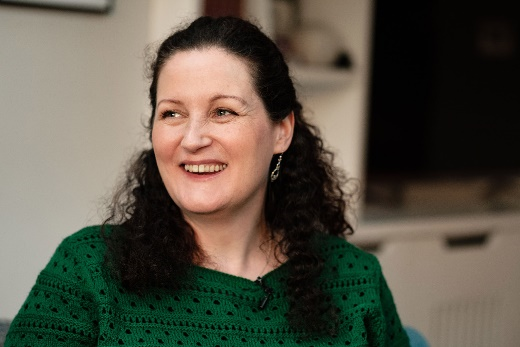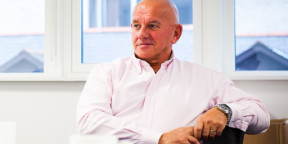Davina’s story
“It was after my tour in Bosnia that I felt like l had turned to stone inside – I didn’t care about anyone else’s problems. It used to drive me mad when people moaned or whinged about their lives."
“But when I came to Combat Stress, my therapist made me see that from what I’d seen, I couldn’t take in anything else - my cup was full as it were. I’ve seen the cruelty that humans can do and the devastating effects. And this has affected how I see life today. I know now I just need to walk away if someone’s daily moaning is getting to me, rather than getting angry and upset.”
Davina, who is now 43, grew up in Northern Ireland and joined the Army Air Corps aged 23. She served for four and half years as a regular and a further two and a half as a reserve.

“My tours took me to Bosnia, Cyprus, the Middle East (to name just a few), and I often found myself involved in situations where I would wonder afterwards, ‘How am I alive?’ A friend told me I was like a cat with not just nine lives, but many, many lives.
“But when I came back from a tour to Oman, the Army base seemed like a different world to when I’d left it. I didn’t feel like I belonged in the Army anymore.
I decided to leave but it wasn’t easy on civvy street. My Mum had died just before I left the Army, my Dad died soon afterwards and then my husband left me. That was a lot to deal with.
“However, I got a new flat, my job was going well and then I met Matt who became my second husband. All seemed to be great in my life but then we went to visit my sister-in-law in Majorca.
"It was dark when we arrived but, in the morning, when I looked out of the window into the neighbour’s garden, I absolutely thought I was in Bosnia. I felt totally shell shocked, I couldn’t communicate or explain anything.
“It was then my sleeping became awful. I started having a terrible dream, but I could never remember what it was. I became totally exhausted and eventually ended up at a sleep centre to try to get some help. They discovered that I was sleeping like I was in the guard room – I was always alert, even though I appeared to be asleep. It was a sleep psychologist who asked if I’d ever heard of post-traumatic stress disorder. I laughed when he suggested this – I thought he was being ridiculous, especially as I felt I’d recovered well after my tours.
But the psychologist told me to call Combat Stress to get their specialist help. It took me a week to call the Helpline but as soon as I did, things started to get better.
“However, while I wanted to get help, I really didn’t want anyone at work to know what I was going through. I didn’t want to feel any more alien than I already did. I wanted life to carry on as normal, rather than taking six weeks out to do the residential PTSD programme. Combat Stress took my concerns on board and offered me a therapy session one day a week on my day off. This was the perfect solution for me.
“I began to understand how the brain works and how it can be affected by traumatic events.
“In time I did tell my manager at work what I was going through, and she was great – she told me to take whatever time I needed.
I don’t like to admit it but before I got help, I was frightened of my own actions. I felt I was going insane.
“I still get help from Combat Stress today through their Peer Support Service. I go to the group meeting once a month and I find it so useful – it’s a chance to relax and unwind. There’s a real mix of us who attend – young, old, veterans of Northern Ireland to Afghanistan but we’ve all walked the walk, we’ve all been foot soldiers. James, who runs the group, is one of us – he’s a veteran, he’s been through treatment from Combat Stress himself but now he’s here to help.
“It’s the hardest thing to say you need help but at Combat Stress, they understand. They know what you don’t. I used to feel like I didn’t deserve help – I still had all my limbs after all but at Combat Stress I learnt that I was there because I needed to be. My body might be intact, but my mind got damaged.
“Thanks to Combat Stress, I’m so much more relaxed today – I’ve even done an aromatherapy course. It’s a hobby but I love it – especially when I’m able to use it to help someone else.”
Davina has also shared her experiences with us as part of the Combat Stress 100 project, find out more by clicking the button below.
IS THERE SOMEONE I CAN CALL AND TALK TO?
If you're struggling with your mental health, our free 24-hour Helpline 0800 138 1619 is available to veterans and their families.


